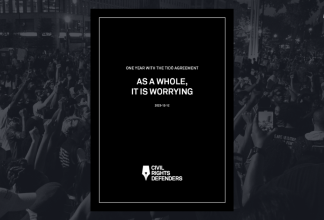Q&A: Lawsuit Against the Swedish State
Who is filing the lawsuit against the state – Civil Rights Defenders or the people in the register?
We act as legal representatives to 11 of the 4700 individuals who were registered by the police.
Who do you represent?
11 individuals, (three of whom are minors) all of whom were registered by the Skåne police. We are filing 11 individual cases against the state, but will ask the court to treat them as one single case since the context and the circumstances are exactly the same.
How long will the process take?
The process can take anything from one to ten years, depending on the result and if we need to appeal or not. We hope that the main hearing in the District Court of Stockholm will take place within a year.
Why are you suing the state?
Due to the fact that the register represents a clear case of ethnic discrimination. To register individuals merely based on their ethnic origin constitutes a violation of Swedish law and human rights principles.
The register has already been declared illegal – what makes your case different?
The legal bodies that declared the register illegal (The Swedish Commission on Security and Integrity Protection and The Chancellor of Justice) made their judgements on grounds other than those we bring forth. They did not state that the register is a case of ethnic profiling. Instead they focused on data protection issues and concluded that from an integrity point of view the dealing with personal data had been inadequate. As a consequence of this, the people we represent do not feel that the biggest violation has been recognised; i.e. ethnic discrimination.
Do any of the individuals in the register have any connection to criminal activity?
It is quite possible that there are individuals in the register with a connection to criminal activity. This is however not the case with the people that we are representing. They have neither any criminal connection, nor any close kinship to anybody who does. There is no other reason for them to have been registered than being Roma.
The register never had any legal consequences for the people who were registered. In fact, they were not even aware of its existence before it was revealed in Dagens Nyheter. Why is the register such a serious infraction?
For centuries, Swedish public authorities have discriminated against the Roma and in particular, the police have discriminated against the Roma community and have a long tradition of acting based on prejudices against this group. When it became public that the police kept this register, it was but one more expression of this century-old discrimination. Many bear witness that they already mistrust the police and other public authorities. Now, this gap is even wider.
Why do you file this lawsuit to the Court of Stockholm instead of the European Court of Human Rights in Strasbourg?
Had we taken the case directly to the European Court of Human Rights, we would face the risk of being redirected back to the national level for failure to exhaust domestic remedies. In addition to this, the legal procedures are longer in Strasbourg than in the national Courts and can take up to seven years. We also want to act in the country where the register was set up and test our legal system with respect to what extent our national courts can deal with such a serious case of ethnic discrimination.
Why are you representing only eleven of the thousands of victims?
We have chosen to represent a small number of people since the case would become too cumbersome if more individuals were included. For legal reasons, we decided not to present a class action.
How did you make the selection?
The people we represent are women, men and minors without any criminal connection. They are people with whom Civil Rights Defenders has been cooperating for a long time and with whom we have a strong bond of mutual trust.
What happens with the other people in the register if you win?
If we win our case it is likely that the judgment will set a precedent for coming similar cases. It will then be open to other individuals registered under the same circumstances to bring forth their cases and demand reparation on the same legal grounds.


